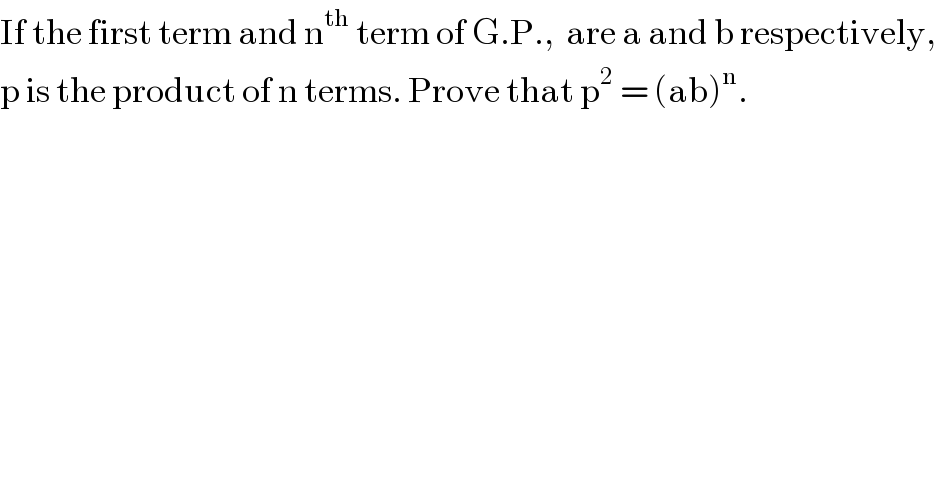
Question Number 47628 by 786786AM last updated on 12/Nov/18

$$\mathrm{If}\:\mathrm{the}\:\mathrm{first}\:\mathrm{term}\:\mathrm{and}\:\mathrm{n}^{\mathrm{th}} \:\mathrm{term}\:\mathrm{of}\:\mathrm{G}.\mathrm{P}.,\:\:\mathrm{are}\:\mathrm{a}\:\mathrm{and}\:\mathrm{b}\:\mathrm{respectively},\: \\ $$$$\mathrm{p}\:\mathrm{is}\:\mathrm{the}\:\mathrm{product}\:\mathrm{of}\:\mathrm{n}\:\mathrm{terms}.\:\mathrm{Prove}\:\mathrm{that}\:\mathrm{p}^{\mathrm{2}} \:=\:\left(\mathrm{ab}\right)^{\mathrm{n}} . \\ $$$$ \\ $$$$ \\ $$
Answered by math1967 last updated on 12/Nov/18
![P=a.ar.....ar^(n−1) [r=common ratio] P=a^n .r^(1+2+.....+(n−1)) P=a^n .r^(((n−1)(n−1+1))/2) P=a^n .r^((n(n−1))/2) P^2 =a^(2n) .r^(n(n−1)) P^2 =(a.ar^(n−1) )^n ∴P^2 =(ab)^n [∵ b=ar^(n−1) ]](Q47635.png)
$${P}={a}.{ar}.....{ar}^{{n}−\mathrm{1}} \:\:\:\:\:\left[{r}={common}\:{ratio}\right] \\ $$$$\:{P}={a}^{{n}} .{r}^{\mathrm{1}+\mathrm{2}+.....+\left({n}−\mathrm{1}\right)} \\ $$$$\:{P}={a}^{{n}} .{r}^{\frac{\left({n}−\mathrm{1}\right)\left({n}−\mathrm{1}+\mathrm{1}\right)}{\mathrm{2}}} \\ $$$${P}={a}^{{n}} .{r}^{\frac{{n}\left({n}−\mathrm{1}\right)}{\mathrm{2}}} \\ $$$${P}^{\mathrm{2}} ={a}^{\mathrm{2}{n}} .{r}^{{n}\left({n}−\mathrm{1}\right)} \\ $$$${P}^{\mathrm{2}} =\left({a}.{ar}^{{n}−\mathrm{1}} \right)^{{n}} \\ $$$$\therefore{P}^{\mathrm{2}} =\left({ab}\right)^{{n}} \:\:\:\:\left[\because\:{b}={ar}^{{n}−\mathrm{1}} \right] \\ $$
